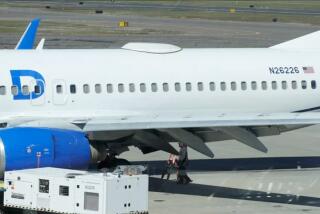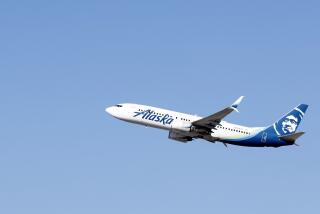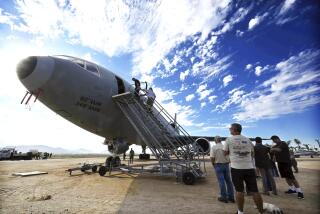Iowa Crash Is Latest Crisis for United Chairman Wolf
- Share via
Wednesday’s tragic crash of a United DC-10 as it attempted an emergency landing in Sioux City, Iowa, is the worst in a string of crises faced by Stephen M. Wolf in his short stint as United’s chairman and chief executive.
Wolf, who flew to the Iowa farming community Thursday to meet with government investigators and comfort injured passengers and crew, has steered the nation’s second-largest airline through persistent takeover rumors and confrontations with its pilots.
Regarded as an airline turnaround expert, Wolf joined United 19 months ago after stints at Republic Airlines and Los Angeles-based Tiger International. They were both troubled airlines when he arrived, but Wolf cleaned up Republic and then Tiger in short order by streamlining route systems and winning valuable wage concessions from employees.
He helped sell Republic to Northwest Airlines in 1986 and paved the way for Tiger’s sale to Federal Express earlier this year.
The disastrous crash at Sioux City’s small airport, which killed more than 100 people, is the latest challenge for Wolf, a no-nonsense executive known for his trademark red suspenders. He evokes strong feelings from his employees.
“I kind of admire the guy and am angry at him for sometimes being a jerk,” said Rick Maguire, chairman of Flying Tiger Line’s pilot group. Maguire credited Wolf with turning around the airline, which had been losing $76,000 a day when Wolf arrived, but said pilots still resent the steep paycuts they accepted under pressure from Wolf.
Those who have worked with Wolf describe him as a benevolent dictator, one who is not afraid to show leadership. On Thursday, he took a 6 a.m. chartered flight to the Iowa crash site and later met with Flight 232’s crew at their hospital bedsides. In a statement, Wolf expressed admiration for the crew and pledged United’s support for the families of those who died.
It is not known what impact the Iowa disaster will have on United.
Alternating Engine Speed
Investigators from the National Transportation Safety Board have focused their attention on the aircraft’s rear General Electric engine. A source close to the investigation said it is believed that the rear engine exploded and debris from the blowout severed the airliner’s hydraulic lines, making it impossible to steer.
The crew, according to a source close to the investigation, remarkably guided the plane toward the runway by alternating the speeds of the right and left engines, in much the same way an oar is shifted from side-to-side to paddle a canoe.
When Wolf, 48, arrived at United in December, 1987, the airline was in turmoil. The airline’s previous chairman had resigned under pressure from its militant pilots group and from Coniston Partners, a New York investment firm that threatened to seize control.
United’s board had already started to trim the company back from a travel conglomerate to simply an airline. Wolf quickly helped dispose of the Westin Hotel chain and half of the airline’s Covia reservation system, raising nearly $2 billion. Impatient investors received $2.8 billion in a massive stock buyback program.
Wolf worked fast to reduce costs and streamline the airline’s route system. Unpopular flights, such as a 5:45 a.m. trip from Cleveland to Buffalo, were dropped. A program of offering television sets and fur coats to employees as rewards for cost-saving suggestions brought results: One suggestion to cut radishes out of salads on some flights saved $9,600 a year.
Wolf has also taken steps to expand and modernize United’s fleet, among the industry’s oldest. The airline has recently placed orders and options for more than $18 billion worth of aircraft to replace aging domestic aircraft and to beef up the airline’s already powerful position in the Pacific travel market.
And earlier this week, Wolf said United plans to start flying to seven cities in Europe in the next two years, in an effort to transform once-sleepy United into a huge global airline.
Gaining on Competition
Airline industry analysts praise Wolf’s accomplishments at United, which is starting to slowly regain domestic markets it lost to American Airlines and Delta Air Lines--its chief competitors--during the early 1980s.
“He took an airline that really had not been focused for some time in terms of growth and very quickly repositioned it,” said Hans Plickert, an airline industry analyst with the Transportation Group in New York. “United has become very aggressive in the airline business. There is a hustle and bustle about United that has not been there for years.”
But Wolf has suffered a number of setbacks, most notably his failure to reach agreement with the airline’s pilots. There has been no agreement in 14 months of contract talks between the pilots union and management. Because there is no agreement, the pilots have refused to fly a new Boeing 747-400 delivered to United late last month. The pilots union is said to be displeased with the new aircraft because it takes only two people to fly it. Most of United’s airliners have three-man crews.
In another sign of their displeasure, the pilots union said two weeks ago that it may revive its bid to acquire the airline and oust Wolf. Such takeover talk has pushed up the price of United’s shares $11 in the last two weeks. United closed on Thursday at $172, down $1.50.
United is thought to be ripe for a takeover because of its valuable Pacific route system, labor unrest, its extensive fleet and enormous cash flow. United owns 80% of its planes, which have a market value of $3.6 billion. That, and the $1 billion cash that United’s operations generate, could be used by a raider to finance a takeover. Wall Street analysts have estimated that United may be worth as much as $270 a share.
Besides takeover threats, Wolf has had to deal with an earlier airline tragedy. In February, a cargo door popped open and tore a gaping hole in the side of a Boeing 747 as it cruised 22,000 feet over the Pacific near Hawaii. Nine people were killed.
Investigators are still investigating the cause of that accident, but the inquiry turned up a flaw in United’s inspection procedures. Due to what a United executive described as a “clerical error,” the airline failed to pass on a portion of a Federal Aviation Administration safety directive to its maintenance crews. The missing paragraph warned crews to inspect cargo doors for damage when they are closed manually.
More to Read
Sign up for Essential California
The most important California stories and recommendations in your inbox every morning.
You may occasionally receive promotional content from the Los Angeles Times.













